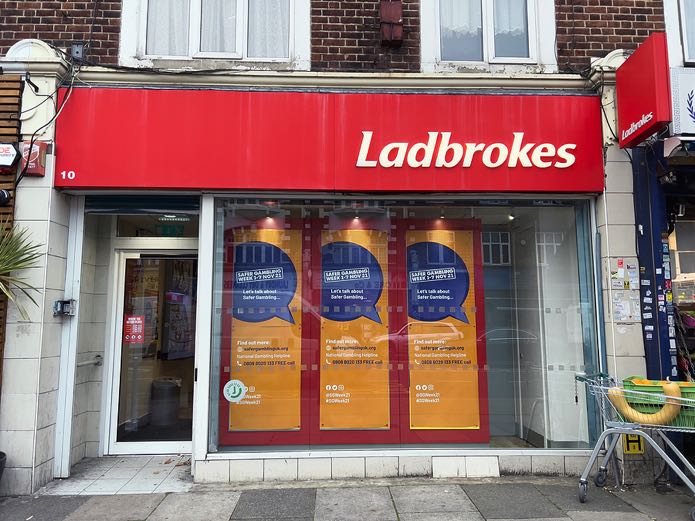 The days of having to head into your local or city centre to get a bet on are a thing of the past, with online betting so easy to get involved with. All you need is a computer or mobile device and an internet connection of some kind, and you will have access to dozens of online bookmakers via their mobile sites and dedicated apps.
The days of having to head into your local or city centre to get a bet on are a thing of the past, with online betting so easy to get involved with. All you need is a computer or mobile device and an internet connection of some kind, and you will have access to dozens of online bookmakers via their mobile sites and dedicated apps.
Not all bookmakers are the same, of course, and some are more appealing than others thanks to the value of their odds, the quality of their website/app, the features they offer and so on. The choice of which bookmaker you use is completely up to you, although later in this article we’ll take a deep dive into some of the factors to consider when selecting which bookie you want to bet with.
Online Bookmakers List

Bet £5 Get £20
Coral are a great option for someone who wants a bookie who has a bit of everything. They've got good coverage of all the major sports, decent odds, regular offers and an easy to use site. Plus all the features you'd expect to see from a bookie of this caliber - cash out, live streaming, in play betting and so on.
Key Facts
- License Holder - LC International Limited (License #54743)
- Deposit Protection - High

Bet £10 Get £50 in Bonuses
Fred Done is the self appointed "Bonus King", which is a pretty big boast but one that is perhaps well deserved. We're big fans of their offers though, particularly the spread and regularity with which they on offer. There's almost always something happening on the promo pages of the Betfred site, so if you're mainly into the deals we'd strongly suggest giving Betfred a look.
Key Facts
- License Holder - Petfre (Gibraltar) Limited (License #39544)
- Deposit Protection - None
What Is a Bookmaker?

Once upon a time, the only place to get a bet on was with a bookmaker at a racecourse, but that evolved in the 1900s with high street betting shops and then, at the start of the new millennium, with online bookmakers. Quite simply, a bookmakers offers odds on thousands of betting markets every day, and they welcome punters to put their bets on at the prices provided.
A bookmaker will employ an in-house trading team to determine the probability of something happening, e.g. what is the likelihood of each horse in the field winning the Grand National, and then translate those probabilities into odds. If your bet loses, they keep your money. If your bet wins, they will pay out your winnings based on a calculation of the amount you have wagered and the odds you have taken.
In modern times, the remit of the online bookmaker has shifted to also become an excellent resource for sports fans. You can check out pre-game stats like league tables and form, analyse the in-play data once the action is underway and even take advantage of features like live streaming, which enable you to watch live sport happening all over the world with a few taps of your screen.
What Exactly Does a Bookmaker Do?

In theory at least, the job of a bookmaker is a simple one: to offer odds, take bets and pay out as necessary. But there’s a bit more that goes into it than simply pulling prices out of the air, and so a bookmaker will employ their own in-house team of analysts to determine their odds based on a) the likelihood of the outcome and b) protecting their bottom line.
That’s about it, really, as far as what a bookmaker does is concerned, but how they actually make their money is another matter entirely – and it’s something that all punters should be aware of.
How Do Bookmakers Work?

If a bookmaker simply took the bets that their customers wanted, they could find themselves in a rather problematic position if a red-hot favourite was to prevail. They would have what is known as a sizable ‘liability’, meaning that the amount they would have to pay out would cause their accountants a considerable headache.
The Bookies’ Margin
There’s a few mechanisms that the bookies use to protect their position. The first is by implementing an overround into their odds, which is effectively a built-in margin that helps them to hedge their losses and maximise their return.
Think about it this way. If they were to offer odds on the toss of a coin, you would expect even money to be given on heads and the same for tails – it’s a 50/50 chance, after all. But to make money, the bookies would offer something like 10/11 on either side, which protects against a major liability and keeps their book neatly balanced.
Calculating the Overround
From the punter’s perspective, the lower the overround, generally the better odds you will get. The good news is that you can actually calculate this ‘vig’, as it sometimes known, with a simple calculation: change all of the odds in a game/race to implied probabilities, add them together and then subtract 100.
Here’s an example:
- Manchester City – evens (implied probability of 50%)
- Liverpool – 9/4 (30.8%)
- Draw – 5/2 (28.6%)
And, so (50 + 30.8 + 28.6) – 100 = 9.4. So, this particular bookmakers’ overround is 9.4%.
Laying the Market Protagonist
The bookmakers will also look to balance their books, and protect against a massive liability, by laying off some of their take to other bookies and betting exchanges. So, they might be sat with a liability of millions on an odds-on favourite, and they will protect against by laying the market protagonist in order to protect against a significant loss.
Cash Out
Another way that a bookie will balance their books is by offering a cash out to punters, especially those markets where they have a significant liability. They can hope that individuals will take them up on their cash out offer and lighten their load. The practices outlined here explain why bookmakers yield a huge intake each and every year, despite the relatively precarious nature of the business of taking bets.
Not all Bookies Are the Same: Features to Watch Out For

As touched upon earlier, although all bookmakers essentially offer the same thing, no two firms are the same. All books reach their odds in different ways, and call upon different software developers to create their websites and apps – hence why betting sites and apps tend to look unique to one another.
There are other features that separate bookmakers from one another, so here’s a look at some of the things you should be considering when registering for a new bookie account.
Quality of Odds
If you want to see how each bookmaker differs when it comes to their odds, use a price comparison website for any major sporting event. There is some overlap, but each bookmaker will come to their own conclusion as to how to price a particular market.
If you are thinking about joining a new bookmaker, the competitiveness of their pricing should be one of the primary factors behind your decision. The more often you get the best odds, the more you will be able to maximise your return – over a high volume of bets, the difference really will count.
Usability
Most of us have loaded a website or app in the past and thought, ‘wow, this is terrible’. The usability of your betting platform of choice really is so important. It should be easy to navigate between sports and markets, and your betslip should be simple to complete.
Other account functions, such as making a deposit or checking for available promotions, should be straightforward too, while page loading speeds will often be the difference-maker in whether this is an online bookmaker you bet with long term or quickly leave behind.
Customer Support
Like an insurance policy, customer support is something you don’t really think about until you truly need it. But whether it’s verifying your account or checking the status of a payment, you’ll be glad you have chosen a bookmaker with a robust customer support provision.
Some online bookies outsource their customer support, which is not always ideal, whereas the best firms are those that offer punters a wide range of ways in which to access assistance – phone, email, live chat, social media and even WhatsApp.
Payment Options
Unless there’s a complete sea-change in UK gambling law, you should know that you cannot make deposits into your online bookmaker accounts using your credit card.
Debit card payments are fine, as are those completed with e-wallets, such as PayPal and Skrill. These are pretty much universally accepted by all UK online bookmakers, but if you prefer to use a different option then you will need to shop around.
From Apple Pay to cryptocurrencies, you will find UK bookmakers that support these payment options, so do your homework to find those that best suit your needs.
Bonuses & Promotions
Most online bookmakers will offer new customers a welcome bonus of some kind – it’s usually along the lines of ‘Bet X, Get Y in Free Bets’, a deposit bonus or something similar. These are a carrot to be dangled, not just as important are the promotions available to existing customers too – these can prove very useful in your betting.
Enhanced Odds Specials are one way you can boost the return on your bets, while some firms hand you a specific number of odds boosts you can use each week/month on bets of your choosing.
For horse racing punters, Best Odds Guaranteed is one of the key promotions to look out for, while faller insurance or money back if second are two other options worthy of consideration. Those that enjoy an acca or two on the football should seek out acca insurance (money back if one leg lets you down) or winnings boost (an extra % on your winnings) to add some extra value to your betting.
Extra Features
There is a number of additional ‘extras’ to consider when choosing your online bookmaker. Which you seek out are individual to your own betting preferences, but those that want to bet in-play as well as pre-game should seek out a firm that offers a comprehensive live wagering experience. That includes odds that change by the second and live streaming, to name just a few things.
Cash out if a feature that some punters seek, while the ‘bet builder’ tool – which allows you to add multiple selections to a single bet that would otherwise be related contingencies – is another.
If you use Twitter, you will find that some bookies will take your bet requests there, before sending you a link via which you can wager on your selections. This can be beneficial where the scope of their bet builder tool doesn’t go deep enough for your needs.
Deposit Protection
Finally, a word of caution to consider. What happens if a bookmaker goes bust? Do you get your money back? Do open bets get refunded or settled? If you bet with one of the top-tier UK bookmakers, you don’t really need to worry about them going bankrupt any time soon. But some of the ‘softer’ books that are licensed to operate in the UK seem to be on a much less secure footing.
What happens to your money if they do go bust depends upon the level of deposit protection they have in place. This ranges from high (you WILL get your money back) to medium (you MIGHT get your money back) to low (you almost certainly WON’T get your money back).
All bookmakers have to explicitly confirm what level of deposit protection they have in place in their terms and conditions, so you can easily find out where each firm stands on the matter. Although it would be unfair to black-ball ‘low’ deposit protection bookies completely, you should be aware of what might become of your money if you do join them.
Are Online Bookies Legal?
 You can bet with complete confidence at your bookmaker of choice, as sports betting is legal in the UK. To operate on UK soil, a bookmaker must apply for a licence from the UK Gambling Commission, and when granted one they must also abide by the regulations that are set out for them – if they don’t, they can be hit with sanctions that include sizable fines and even temporary or permanent licence revocations.
You can bet with complete confidence at your bookmaker of choice, as sports betting is legal in the UK. To operate on UK soil, a bookmaker must apply for a licence from the UK Gambling Commission, and when granted one they must also abide by the regulations that are set out for them – if they don’t, they can be hit with sanctions that include sizable fines and even temporary or permanent licence revocations.
The Commission is tasked with upholding the laws of the industry, which have been changed a number of times throughout the years and currently take the guise of the UK Gambling Act. However, that is expected to be updated in the near future by the government in a bid to reflect the increasing ‘digitalisation’ of sports betting on British soil.
Horse racing has been around for hundreds of years, and this was the first sport to truly embrace betting courtesy of on-course bookmakers. For context, the first set of rules governing sports betting in the UK were introduced as far back as 1845. In 1960, off-course bookies were legalised for the first time in the UK, and more and more punters turned to these high street establishments in order to place their bets.
Online Gambling Act of 2005
It was the digital revolution that forced law-makers to consider another raft of changes to their legislation, and so in came that Online Gambling Act of 2005. This set the guidelines for how betting sites and apps would operate, although some believe these regulations are now out of date – a lot has happened to the internet in the intervening 18 years or so! And that’s why the government is preparing to amend their laws to make them ‘fit for the digital age’.
The regulations that UK bookmakers have to abide by will likely be tightened in the years to come, but you will still be able to bet with complete peace of mind regardless.